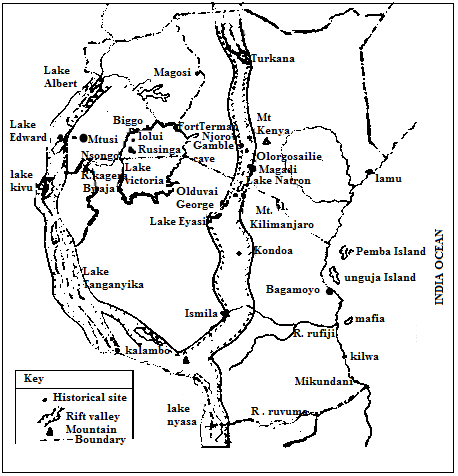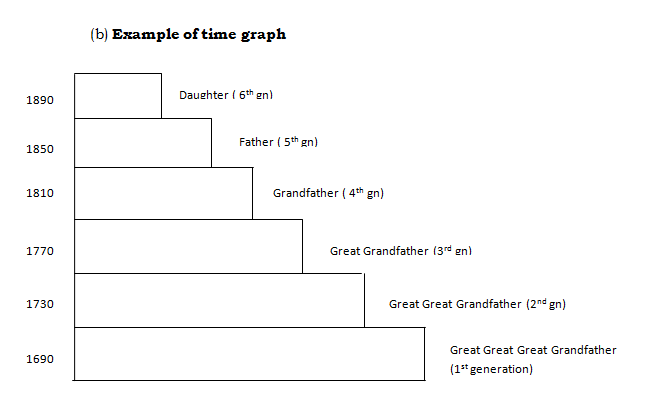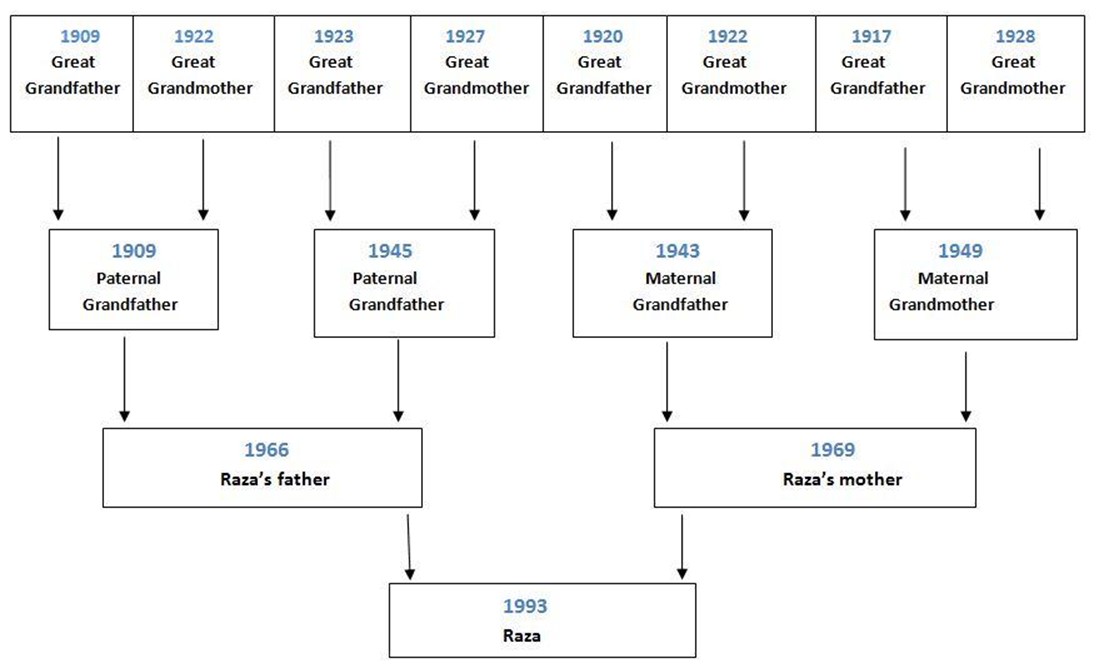SOURCES AND IMPORTANCE OF HISTORY
Meaning of History
History is the study of man and his activities in different times.
These activities enable man to obtain his needs.
Man’s basic needs are food, clothes and shelter.
Importance of studying history
- History enables us to understand how man has been working on his environment.
- History helps us to understand the past and the present, that help us to predict the future.
- It helps us to understand the relationship between people in different periods.
- It helps us to understand technological transformation in human life e.g from stone age to iron age.
- It helps us to get knowledge on society.
- It helps us in making investigation on different problems.
- History helps us to understand our origin.
edu.uptymez.com
TWO LEVELS OF LOOKING AT STUDYING HISTORY
1st level: History explains about man’s struggle to master his environment.
i.e. People irrigating because of drought.
2nd level: History shows the relationship between man and man’s past.
I.e. Hunters and gathers or people met in hunting killed the prey and shared it
SOURCES OF HISTORY
We can obtain historical information through various sources. The main sources are:
- Oral tradition
- Historical sites
- Written records/ documents
- Archives
- Museums
- Archeology
- Audio – Visual record , e.g : C assets,Cd’s,TV Programs etc.
- Anthropology
- Linguistics
edu.uptymez.com
1. ORAL TRADITIONAL
This involves the passing information by word of mouth through talking and listening.
Oral Tradition pass historical information into two ways
- Through culture practices like art, music, religion, riddles, songs, proverbs, superstition, poems and stories.
- Narration of past events.
edu.uptymez.com
FUNCTIONS OF ORAL TRADITION
- It preserves historical information of society.
- It collects and pass historical information between generations in the society.
- It helps researchers in data collection.
edu.uptymez.com
ADVANTAGES OF ORAL TRADITION
- It preserves and reveal historical information which are not recorded.
- Both illiterate and literate people can obtain historical information.
- Within oral tradition there are warnings and teachings.
- It is the easiest and the cheapest method of obtaining information.
- It is more live source, since it involves physical interaction.
edu.uptymez.com
DISADVANTAGE OF ORAL TRADITION
- It needs much attention and power of memory.
- False information can be given by a story – teller.
- Narration of past events are centered to those people of status i.e kings, Queens, chief. White talking little about common society.
- There is language problems when narrators use vernacular language.
- It is difficult to distinguish what is real and what is imaginary information.
- Translation is very difficult because some languages are no longer in existence.
edu.uptymez.com
2. HISTORICAL SITES
Are special places where by the past human remains can be found and shown to the public?
These are places in which the remains of once lived human in the past can be found.
- They comprise man’s physical development, tools that were made and used from time to time.
- In these areas we find/see past human products and animal bones.
edu.uptymez.com
Example of historical sites include Ismila, Olduvai Gorge, Kondoa Irangi, Bagamoyo, Zanzibar, Kilwa, , Mafia, Engaruka, Kagera etc in Tanzania.
Nsongezi, Biggo, Ntubi, Rusinga island, Magosi and Ishago in Uganda.
lake Rudolf (Turkana), Lake Naivasha, Njoro, Olongesailie, Lake Magadi, Lamu, Mombasa and Mt. Kenya. In kenya.
MAP OF EAST AFRICA SHOWING IMPORTANT HISTORICAL SITES.

FUNCTIONS OF HISTORICAL SITES
- Preserve historical information for the coming generations.
- They are useful sources of information and to reconstruct history.
- They are the symbols of social cultural heritage to the society concern past human tools, rock, paints etc.
edu.uptymez.com
ADVANTAGE OF HISTORICAL SITES.
- They helps for practical historical learning
edu.uptymez.com
e.g Through observation of the past human tools, rock, paints.
- Used to reveal past settlement patterns, levels of technology, economic development of political organization-reached by the past societies.
- Act as centers of tourism.
- They help in transforming theoretical teaching of history to practical historical leaning.
- It acts as the resource centers to researchers.
- It provides employment opportunities: eg guiders.
edu.uptymez.com
DISADVANTAGES OF HISTORICAL SITES
- It brings confusion to interpret the remains found in historical sites
- Many of the historical sites are found on remote areas hence difficult for many people to visit them.
edu.uptymez.com
3. ARCHAEOLOGY
Is the scientific study of past human remains
- This is the study of the material remains of man’s past through scientific methods.
- The one specializes in archaeology is called ARCHAEOLOGIST.
- Archaeology involve excavations (digging) of the remains of man’s past historical sites and interpretation.
- The famous archaeologist in East Africa was Dr, Louis Leaky with his wife Mary Leakey.
- Archaeology involves the use of carbon 14 dating to determine plants and animal remains.
edu.uptymez.com
FUNCTIONS OF ARCHAEOLOGY
- Gives important information about man through different stages.
- It is a useful method of revealing soil covered historical remains.
- It arouse curiosity of searching past man historical information
edu.uptymez.com
ADVANTAGES OF ARCHAEOLOGY
- It helps to know when and how people lived in a certain place.
- Past objects tells us about the life and culture of past people.
- It helps us to know and reveal the technology, pastoral,agricultural and commercial activities of the past man.
- Through excavation we get knowledge of artifacts e.g pottery, building etc.
- It reveal the religious beliefs of the past man.
- We can compliment other sources of information through archaeology. eg. history.
- We can know the past relationship between different people such as trading activities, Migration, Marriage, Birth, death and political relation.
edu.uptymez.com
DISADVANTAGES OF ARCHAEOLOGY
- It consumes time because of excavation.
- It can not reveal the past people‘s language.
- It can not give out reasons for historical events such as wars.
- It needs full experts and advanced technology.
- Poorly interpreted remains can bring false information.
edu.uptymez.com
It can not tell anything about the past social organization.
4. ARCHIVES
These are places where collection of private and public documents and old records are preserved.
These documents includes personal letters, Early Travelers and Missionary records, Traders writings, personal and government files, political parties documents, etc.
FUNCTION OF ARCHIVES
(a) Archives preserve public and private records that have enduring value to the society.
(b) The records in the archives are made available for use by the public. However not all records can be viewed by everyone.
(c) Archives collect records of enduring value from various places. For example,the nation archives have records from different regions of the country.
(d) The archives staff maintains registers of the record in the archives.
(e) Archives promote awareness of the availabilities and use of non – current records to the public
(f) Archives have facilities for restoring damaged documents of enduring value
(g) The historical information in the archives ensures continuity . For example,company policies from previous years can still guide the employees today
ADVANTAGES OF ARCHIVES
- Easy to identify ideas and literacy level of the past man.
- It is easy to identify the exact date of historical event.
- It used to store historical information.
- Easy to get historical information from different places and different people.
edu.uptymez.com
DISADVANTAGES OF ARCHIVES
- It may lead false information, if Author is biased.
- Illiterate people can not get historical information.
- It is not easy to get information of the society whose information are not documented.
- It is difficult to get remote information from archives.
- It is non renewable once disrupted either by wind or other external force.
edu.uptymez.com
5. MUSEUMS
- These are places or buildings where information and objects are preserved.
- It involves all terms which shows culture, political economic and technological development from the past to present.
- Objects can be Early coins, clothes, minerals cowries, religious and ceremonial symbols.
- Museums can be national, Regional, Districts and village.
edu.uptymez.com
e.g National Museums in Dar es salaam, Bagamoyo, Butiama, Kalenga – Iringa
FUNCTIONS OF MUSEUMS
- Preserve historical documents and objects.
- Shows concrete remains of objects.
- It is the place for tourist and study tour.
- It is the center for cultural and national identity.
edu.uptymez.com
ADVANTAGES OF MUSEUMS
- It preserve objects which are used as teaching aids.
- Museums preserve culture and national Identity.
- It used by researchers (source of information).
- It acts as tourist center.
- People learn about technological development.
- Enable learners to arouse creativity
edu.uptymez.com
DISADVANTAGES OF MUSEUMS.
1.It needs knowledgeable people.
2. It is possible to distort information through biasesby the museum attendant.
3. Poor preservation of the past items eg .coins,pieces of cloth,slaves chain can distort information.
4. It needs extensive care to maintain it’s beauty or origin.
6. WRITTEN RECORDS
Are the the documents which comprise written historical information.
- These includes books,letters,maps, magazines,journal, newspaper,minutes of meetings and conferences
- Written records can be found in libraries ,schools,colleges,universities,internet cafes,offices etc.
edu.uptymez.com
FUNCTION OF WRITTEN RECORDS
(a) Written records provides pictures of society.
(b) These records reflect public opinion. at the time of writing. For example, the letters to the editor in newspaper express the readers ‘ feelings on current issue
(c) Written records serve as stores of a large variety of information, including discoveries, government policies,statements, religious beliefs,fashion,speeches and agreement.
(d) In-depth reports of daily events are kept as written records,. For example, in a diary,newspaper or biography.
ADVANTAGES OF WRITTEN RECORDS
- It is easy to get information.
- Easy to make references.
- It is helpful in doing researches.
- They can be kept for a long time.
edu.uptymez.com
DISADVANTAGES OF WRITTEN RECORDS
- It can give false information if they are biased by the author.
- It is difficult to read everything from written records.
- They are subject to be badly written.
- Illiterate people can not get information.
edu.uptymez.com
7. LINGUISTICS
Is the scientific study and analysis of language.
It includes the study of sound, structure, information and relationship between various language groups.
ADVANTAGES OF LINGUISTICS
- It helps to get information from various sources.
- Enable to discover links between different people
- It help to determine dates of historical event e.g “Aluta Continua” (period of struggle for independence in Mozambique).
edu.uptymez.com
LIMITATIONS OF LINGUISTICS
- It consume time and finance learning a particular language.
- Through translation one can commit some important work.
- The present language may be corrupted.
edu.uptymez.com
8. ANTHROPOLOGY
Is the study of the society’s cultural systems, beliefs, ideas etc.
The study can give important information about movements, settlements and production activities of the past.
DATING HISTORICAL EVENTS
Historians usually divide time into several categories, namely
- Day – is a duration of twenty four hours (24hrs)
- A week – is a duration of seven days (7 days)
- Month – is a duration of four weeks (4 weeks)
- A year – is a duration of twelve months (12 months)
- A decade- is a duration of ten years (10 yrs)
- A century – is a duration of of one hundred years (100 yrs)
- A millennium – is a duration of thousand years (1000 yrs)
- A generation – is the average differences on ages between a child and his/her parent.
- Age – is a period based on man’s economic activities and the type of tools used e.g stone age, iron age, Industrial age, Science and Technology age, ect.
- A period – is determined by one continuous event lasting for a number of year.
edu.uptymez.com
e.g Period of slave trade in East Africa
Period of long distance trade
Period of colonial rule in Africa
Some points have been chosen in order to divide time
- Year ZERO –present the year when Jesus Christ was born.
- It is known as Anno Domino
edu.uptymez.com
(A.D) meaning the year of the Lord
All years before Zero are called (B.C) meaning (Before Christ)
HOW TO DETERMINE DATES
Dates are instrument in the science of History, this historians divided dates into four ways: –
- Recalling events : – here important events are recalled/remembered e.g drought, farming, floods, birth, eruption of diseases etc.
- By studying languages: – some names help people to remember dates of some events. E.g word “Karafuu”- started when cloves were introduced in Zanzibar.
- Carbon 14 – Is scientific method of determining dates. It used in the finding dates for remains of animals or plants which died beyond 5000 years ago.
edu.uptymez.com
- Carbon 14 is a gas found in carbon-dioxide which exist in the atmosphere.
- It absorbed by plant or other living organisms. When died carbon 14 that has already observed starts to decay at a fixed rate from the time of death.
edu.uptymez.com
- Orders of events: Ways of showing order of events, periods and ages, among them are: –
edu.uptymez.com
- Time graph
- Time chart
- Time line
- Family tree
edu.uptymez.com
- Example of time chart
edu.uptymez.com
|
S/N |
PERIOD A.D |
EVENTS |
|
1 |
1884 – 1885 |
The Berlin conference |
|
2 |
1914 – 1918 |
The first world war period |
|
3 |
1939 – 1945 |
The second world war period |
|
4 |
1961 |
Tanganyika became independent |
|
5 |
1962 |
Tanganyika became republic |
|
6 |
1992 |
Introduction of multipartism in Tanzania |
edu.uptymez.com


(d) Family tree 
